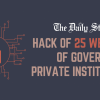Will Khadija’s ordeal end with her release?

We are relieved to know that, after an excruciatingly long wait, Jagannath University student Khadijatul Kubra has been finally released from jail on bail. Khadija was arrested on August 27 last year, after police pressed charges against her in two cases under the Digital Security Act (DSA) in October 2020. Her "crime" was that she had hosted a Facebook webinar where a guest speaker apparently made "contentious" remarks. It should be noted that during her 14-month imprisonment, several of her bail pleas were rejected.
While we welcome her long-overdue release, we must ask: what was Khadija's fault in the first place? Who will answer for framing an underage girl—Khadija was 17 when she was sued—in a DSA case? Should a person be detained or jailed for merely holding a webinar? These are vital questions that need to be answered. Khadija has been granted bail for now, but the cases filed against her remain in place. That means she still has to continue her legal battle, if from outside jail, which may be no less agonising going forward.
Unfortunately, ever since the DSA came into being in 2018, a lot of people including journalists, government critics and human rights activists were harassed by the law. Their "crime," too, was expressing their opinion. Recently, the government passed the Cyber Security Act (CSA) replacing the DSA, but as legal experts and journalists have pointed out, beyond some changes in sentencing, almost all the controversial provisions of the law have been retained in the CSA, meaning that the threat to freedom of expression and independent journalism very much remains.
After being released from jail, Khadija has said that what she faced over 14 months in jail was an injustice and that she had committed no crime. This is not only sad but also unacceptable. We urge the higher authorities to withdraw the cases filed against her, take steps to address the grievances caused, and also repeal this draconian law—whatever name it carries—for good.


 For all latest news, follow The Daily Star's Google News channel.
For all latest news, follow The Daily Star's Google News channel. 








Comments